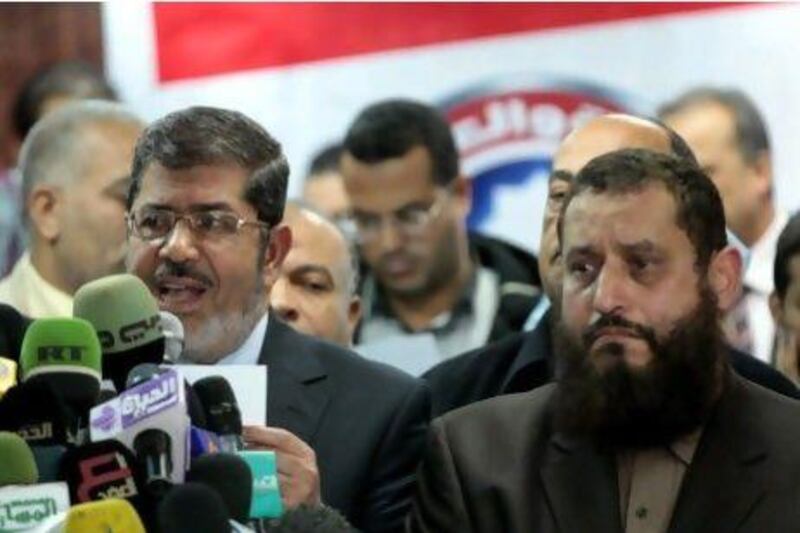CAIRO // The political dawn of the Salafists in Egypt has hit a snag.
After decades quietly amassing a following while steering clear of the corridors of power, Salafi movements rose to unprecedented political heights last year after the overthrow of Hosni Mubarak, becoming the second-most powerful bloc in parliament. Now, perhaps inevitably, fissures have formed as they struggle to transform a popular, multifaceted religious movement into effective political institutions.
A heated dispute at senior levels in Al Nour Party - viewed as the political arm of the Salafi Daawa movement, as the Freedom and Justice Party is the Muslim Brotherhood's political wing - is threatening to split the group. At least one affiliated group, the Salafist Front, is planning to withdraw from Al Nour to create its own party.
"Many sheikhs from the supreme committee of the Daawa were even asking that we finish our relationship with Al Nour Party completely," said Abdel Azim, a high-ranking official in the Daawa in Alexandria. "It is dividing the Salafists."
The prospect of the main Salafi party splintering is likely to curb the influence of religious hardliners in parliamentary elections this year and have ramifications for the writing of a new constitution.
The Salafists' inexperience in the give-and-take of electoral politics is glaringly apparent.
"They are now facing the harsh reality of politics," said Mazen Hassan, a professor of political science at Cairo University. "As they have tried to institutionalise, it has generated internal strife and they will emerge weaker from this."
Salafists, who believe in modelling their lives on the earliest followers of Islam and want Egypt to become a more rigid Islamic state, surprised Egypt's political establishment last year when Al Nour party swept 25 per cent of the seats in the parliament.
Central to the rift in the party since then has been the perception that Al Nour's president, Emad Abdel-Ghafour, had allied himself too closely to the president, Mohammed Morsi.
The cracks began to widen at the end of August with the appointment of Mr Abdel-Ghafour as an adviser to Mr Morsi, a long-time top official of the Muslim Brotherhood before he resigned to become the president in June.
The Salafists and the Brotherhood, though both Islamist groups, are the main competitors for voters who believe in a greater role for Islam in governance and law. Yet the latter's pragmatism clashes with the Salafist's puritanism, and they have often been in opposition.
"After he was appointed to work with President Morsi, he began spending less time on Al Nour and it negatively affected the work of the party," said Shaaban Darwish, a popular Salafist imam and member of Al Nour's supreme committee.
Mr Darwish said Mr Abdel-Ghafour was pushing for Al Nour to take part in a broader alliance of Islamist political parties as a strategy to win more seats in the next parliamentary elections. He was also trying to transform the party from a top-down group that takes its orders from clerics into a more democratic institution whose leaders are elected by members.
At the heart of the disputes inside Al Nour is the issue of how much to compromise - or whether to compromise at all.
Among Salafists, there are sharply differing views over issues such as the government seeking interest-bearing loans and the role of women in society. Some believe that they should stick to their core beliefs and refuse to take part in the horse-trading that is innate to politics, while others believe that their ultimate goal of a more Islamic state can only be achieved through the bargaining needed to gain actual power.
Meanwhile, adherents of the influential imam Yasser Borhami, a top official of the Salafi Daawa, instigated a move against Mr Abdel-Ghafour.
Al Nour's supreme committee announced last month that it had withdrawn confidence in Mr Abdel-Ghafour and was appointing El-Sayid Mostafa Hussein Khalifa in his place. Mr Abdel-Ghafour responded by calling for the replacement of the supreme committee. He also refused to accept the committee's decision and maintains that he is still head of Al Nour.
Over the past two weeks, the two camps have fired back at each other with lawsuits and public accusations that have created a deadlock in the party. There are more meetings planned to attempt to resolve the crisis, according to Mr Darwish, but he said there was a possibility the party would split.
The infighting at Al Nour has led the Salafist Front, a youth group, to decide to establish their own political party, said spokesman Khaled Saeed.
"The party was being controlled by people who have a tendency toward Salafism, but they weren't real Salafists," he said. "This division is happening because there is no unity of vision between the different groups in the party."
Mr Saeed said the Salafist Front was beginning the process of forming its own party this week.
"This may create confusion among the voters in the new parliamentary elections, but in the long run it will enrich the political environment," he said.
Follow
The National
on
[ @TheNationalUAE ]
& Bradley Hope on
[ @bradleyhope ]





